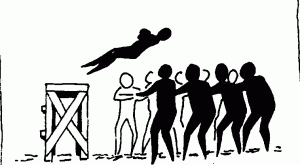The 3 Biggest Misconceptions About Team Building Activities
Try this out: ask your fellow officemates, senior staff, HR department or summer associates if they want to do a “team building exercise.” Chances are you will be met with blank stares at best, or eye-rolling groans at worst. The phrase “team building” has gotten a bad rap over the years, and not without reason.
If you’re like me, you’ve been forced to suffer through some form of group ice breaker, bonding activity or “morale booster” that seemed more suited for a class of kindergarteners than office professionals (if you’ve ever partaken in a “trust fall,” you know what I’m talking about). The idea is nice enough- get the office out of the day-to-day routine with a fun, energetic and informative activity that allows you to strengthen relationships, build confidence and improve the spirits of the group. While some events are creative, unfortunately many of these self-described “team building activities” are exercises in futility, bordering on silliness- a simple Google search for “team building exercises” produces results ranging from obstacle courses to paintballing to fish racing (yes, fish racing- as in, you race live fish).
However, not all “team building” activities need to fall into this dreary pit. Below are the top 3 misconceptions about team building events, and what their benefits can actually be if done right:
1. They’re Boring – If a team building activity is boring, than it’s not an activity at all- it’s a chore. However, a properly-planned & executed team building event will be lively, customized and appropriate for the group, and will be construed as anything but boring.
2. They’re Pointless – So you got out of the office for one day to have a fun bonding experience. Does this really translate into higher productivity and morale in the long run? You bet! So long as the activity is meaningful (allows participants to actively practice collaboration, communication and decision making), impactful (the activity is customized exclusively for the group and its participants) and produces lasting positive memories (is both fun AND unique), when done correctly a team building activity can be just the kick that a group needs to function at a higher, happier level.
3. There’s No Way to Measure Them – The company just invested a tremendous amount of resource in lost productivity to hold a staff “team building event,” and we will never know if it had any impact whatsoever. Right? No way! If the team building activity was run correctly, management will absolutely see a positive change in 1) productivity; 2) employee morale; 3) communication, and 4) collaborative effort. The lessons learned in a well-executed team building event will have been learned in a group setting, which is a powerful force-multiplier when the event was a fun and unique one. A positive team building activity is certain to have lasting impact, if the lessons learned are actively practiced long after the activity has ended.
Do you think that the above arguments countering team building misconceptions are valid? Why or why not?
